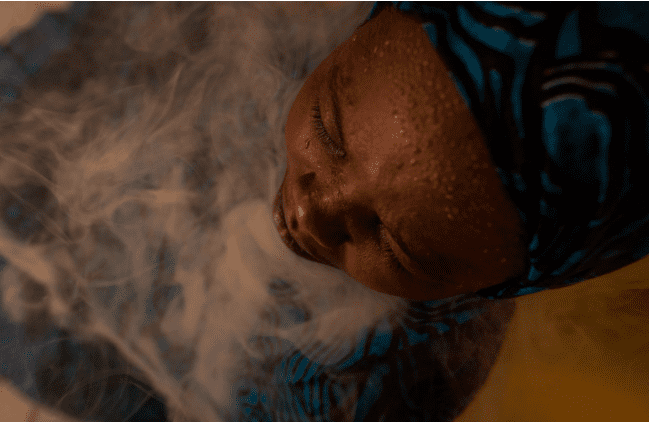Generation Hispanic TV - Live
Dukhan: The Timeless African Beauty Treatment
Dukhan: The Timeless African Beauty Treatment
[simple-author-box]
Modern cosmetics have eclipsed ancient make-up customs, but the dukhan, which dates back to the early third century BC, is still a beauty ritual practised by women today.
Image Source. Body Toxin
When archeologists started excavating the ancient temple city of Musawwarat es-Sufra in Sudan, they knew their discoveries would be notable. After all, the Nubians had established this grand monument in the 3rd century BC, and their queens; Amanirenas, Nawidemak, Amanishakheto, and Amanitore had spent part of their lives here.
But they probably didn’t imagine that one of the first things they would discover in the Great Enclosure – a building complex in the temple – would be an ancient hofrat el dukhan, a smoke bath instrument.
From 3 BC, and possibly earlier, to the year of Coronavirus 2021, taking scented smoke baths in Sudan has been, and still is, a widely practiced custom. This cosmetic ritual, which has been passed down from one generation to another, has crossed geographical borders and is embraced by not only other Black women but also Middle eastern and Asian women. Those who indulge in it do so for pleasure and therapeutic reasons.
It’s getting hot in here
While referring to this beauty treatment in Ancient Nubia, Laszlo Torok wrote, “The queen herself, after discharging her duties in the temple, cleansed herself in the smoke bath and then met the King for intercourse.”
Other archaeologists have also written that the dukhan was to ‘enhance the queen’s sexual appeal.’
Because of the strong aphrodisiac fragrance produced by the smoke, and its association with sensuality and eroticism, the Sudan provinces only allow married women and brides preparing for marriage to perform the dukhan.
In some places, they forbid women from leaving the house until 3 days after the bath.
As the heat opens the pores, the oils absorb deeper into the skin, making it softer, smoother and with a pleasant aroma which lingers for days. It detoxifies and rejuvenates the skin, and helps the body get rid of poisonous wastes through profuse sweating. The dukhan is also said to firm up the body. After childbirth, many Sudanese women take this smoke bath to tighten the vagina and other loose skin.
One Two steps to Dukhan
The first step to the dukhan is mixing a blend of aromatic sandalwood, shaff, talh and stones of solidified frankincense inside a clay pot with coal.
To bathe, a woman strips naked and her female friends or relatives thoroughly rub her in scented oil made from orange peel, sesame oil, clove essence, or other fragrant perfumes. Then, covering herself with a thin blanket, she sits on a chair with a prominent toilet-sized hole. Fire is lit from the coal and the clay pot burning with perfumed aromatic woods placed below this seat.
Image. Gabriela Vivacqua
Like being in a sauna and steam room, her body sweats while it is infused with the heavy sweet scent of burning sandal and acacia woods. She can sit there for as long as she wishes or until the heat becomes unbearable.
Dukhan is usually followed by a scrub known as dilka (sorghum flour paste massage) which is used to exfoliate the body. A warm shower concludes the process. But among brides preparing for a wedding, it is a tradition to perform dukhan two times a day for a month, and during this time, they do not wash. The thick sheet of aromatic oils is left to cover the body for the entire duration and on the last day, this layer is removed to reveal a glowing, soft, and fragrant skin.
More than a beauty ritual
Besides its cosmetic advantages, the dukhan has many health benefits. Men who practise dukhan say they do it for these reasons; which include easing rheumatic pain, muscle aches, and circulation issues. Therapeutic dukhan is also used in treating syphilis and gonorrhoea. When performed for therapy, other medicinal plants like natron and tundub are adopted instead. These healing herbs contain natural antifungal and anti-viral properties which restores health.
From Khartoum to Rabat, California to Lagos, Bali to Bedfordshire, people from different cultures are now performing dukhan. Improvised home versions of it involve burning charcoal on a stove and placing it inside an empty flower pot together with the acacia and sandal woods. After disrobing, one sits on a chair, putting their feet on the flowerpot’s edge and covering themselves with a thin blanket. But be careful when trying this at home; there have been cases where those attempting the dukhan have suffered burns as the cloth they cover themselves with caught fire.
Because of its increased demand, many spas have integrated it as part of their aromatherapy treatments. To make the process safer, they connect a tube to the burning pot, which delivers the dukhan to where the woman is sitting. And if one doesn’t have the time or patience to sit under the dukhan, they can purchase the cream. Rubbing the paste on the body gives it the same look and smell as the real dukhan.
This timeless treatment is catching on around the world for its cosmetic and health benefits, but for Black women, it’s also a practise of radical self love. The Nubian queens in ancient Sudan were unashamed of their powerful feminine presence, and indulged in dukhan to enliven their bodies and sexuality. However, Black women’s bodies today are often hypersexualized and objectified, or presented as completely having no sexuality. The effect is, we are made to be ashamed of our femininity. This sacred ritual therefore gives us an opportunity to centre ourselves.
Image. Gabriela Vivacqua
As we sit smothered in scented body oils, covered with a thin blanket, the smoke from the aromatic woods saturating our bodies, souls and spirit, we honour our womanhood. We relive our heritage, paying homage to the Nubian queens before us. We remember that we are, because they were.
The Queens are dead, long live the Queens!



